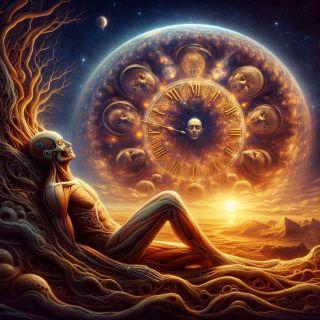Inteligencia Artificial
¿Por qué la IA nunca será consciente?
Una computadora con IA no puede replicar la dinámica de un cerebro consciente.
8 de agosto de 2024 Revisado por Margaret Foley
Los puntos clave
- Algunos científicos y filósofos opinan que algún día la inteligencia artificial podría volverse consciente.
- Una computadora conserva la misma estructura física de un momento a otro.
- En cambio, un organismo vivo nunca es la misma entidad de un momento a otro.
“The brain is never the same from one moment to the next throughout life. Never ever.” Alvaro Pascual-Leone
Some philosophers and scientists are of the opinion that artificial intelligence could one day become conscious. We have seen how this idea has been used in science fiction, such as in Philip K. Dick’s novel Do Androids Dream of Electric Sheep?, which was masterfully transformed into the movie Blade Runner. The simple argument you often hear or read is that if the brain, as a biological machine, can be conscious, any other machine, if it is complex enough, can be conscious. That is, if the computer on which I am typing right now were more advanced, then it would be able to have a first-person perspective of what it is like to be a computer. Complexity here means that my computer would have to have a larger number of elements, with structures and processes that are strongly interrelated.
Equating the brain with a computer because both have been referred to as machines is an erroneous assumption. You can easily label two different objects with the same word: “machine.” That does not change the fact that the brain and a metal-containing machine are two very different entities. Computers operate based on the flow of electricity through their components. But the components themselves always stay the same. In principle, you could shut down a computer and store it in a dust-free environment. A hundred years later you could switch it on again and it could continue processing data. Federico Faggin, one of the pioneers of microprocessor development from the 1960s onwards, in his book Irreducible, makes the distinction between the biological brain and a computer’s processing modules clear:
A living organism is never the same physical and psychological entity from one instant to the next. The computer hardware, on the other hand, remains the same physical structure from the moment it leaves the factory until it stops working or is discarded.
For this esteemed computer pioneer, artificial intelligence can never be conscious. In a computer, we can make the distinction between hardware (my PC), which is fixed and separate from software, the word processer I am using right now. In organisms such a distinction does not exist. A living cell is in continuous flux and exchange with the environment as its metabolism provides cells with energy required to carry out their functions. Brain cells communicate with each other through action potentials (electrical events) and neurotransmitters (chemical events). The brain’s constant chemical remodeling from one moment to the next implies that there is no distinction between hardware and software. The structure and function of the brain are identical with its physiological changes over time.

Este aspecto dinámico de la vida es lo que impide que las computadoras y los robots adquieran conciencia. La inteligencia artificial nunca sentirá lo que es buscar una respuesta a las preguntas que nos hacemos los humanos ni lo que es jugar al ajedrez con nosotros. Una computadora no es parte de la naturaleza dinámica; es un objeto creado por el hombre. Los seres vivos somos fundamentalmente dinámicos. Con cada respiración y con cada latido del corazón transportamos moléculas a través de nuestro cuerpo, que es un sistema dinámico que intercambia energía y materia con el medio ambiente. Además, la conciencia se basa necesariamente en este dinamismo. Pero la mayoría de las teorías de la conciencia no lo tienen en cuenta. Cada momento que sentimos conscientemente se extiende en el tiempo, describible como un flujo continuo de eventos en el momento experimentado de nuestra existencia encarnada. En mi publicación sobre por qué la mayoría de las teorías neurocientíficas de la conciencia están equivocadas, que se basa en un artículo científico que escribí con Lachlan Kent, amplié estas propiedades temporales necesarias de la conciencia. Por ejemplo, mi sensación de sed y el alivio posterior al beber agua helada no es un evento instantáneo, sino que en su dinámica dura un tiempo considerable. Mientras vivimos, somos parte del flujo de eventos en el mundo que habitamos. El tiempo físico como cambio y devenir se refleja en el tiempo fisiológico y, a su vez, se refleja en la experiencia consciente de transición constante, como paso sentido del tiempo. La conciencia como la conocemos está arraigada en los principios de la vida, que son estados dinámicos de devenir. Nosotros, como humanos, somos parte de la naturaleza. Eso es lo que une el tiempo de la física con el tiempo de la biología y con el tiempo de la conciencia.
A version of this article originally appeared in English.

